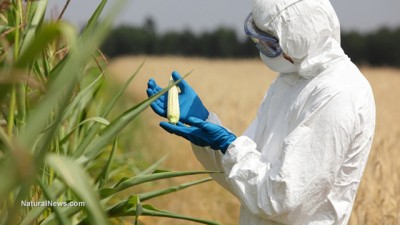Microbial Biologist Says Biotech Is Like a Religion, and it Is Failing
And biotech only made '2 GM traits in 40 years'

No one bats 1000, but according to Ignacio Chapela, a microbiologist from UC Berkeley in California, the biotech industry has utterly failed. He says they’ve only come up with 2 genetically modified traits in 40 years despite fouling our air, water, and soil, while genetically engineering our food to withstand copious amounts of toxic chemicals.
Chapela says that no one talks about just how badly biotech is progressing, despite billions spent on research and the forever-promise of new organisms that repel pests, or to supposedly stop malaria from spreading, or some other biotech-specific trait that they have yet to master.
Chapela points out that GMO scientists have become like priests, with a ‘central dogma’ that specific traits are determined by certain genes. If that were true, we could have put wings on pigs to make them fly. He explains:
“The whole foundation of genetics turns out to be wrong. Eye color is not determined by a single gene. DNA is not a master molecule. We have the benefit of 40 years (of GMOs failing) and should liberate ourselves from the central dogma. How many (GMO) traits have they developed? Two after 40 years.”
Chapela, and others like Bruce Lipton, a PhD biologist, don’t believe that DNA is a ‘master molecule’ that determines a person or plant’s traits. He and those who share his rare viewpoint understand that environment plays a bigger role.
“What I become wasn’t in my grandparents’ DNA, it came from the environment. If that single story is true, the whole edifice of genetic engineering is mud on the ground,” said Chapela at a National Heirloom Seed Expo.
Chapela also points out that genetic engineering is based on an obsolete paradigm and is largely being pushed by a political agenda. He said instead of promoting this dogma, scientists should be challenging the erroneously-erected paradigm, instead of selling out to it.
“The knowledge that a farmer has is as important as the soil, and seeds can’t be seen in isolation,” Chapela said.
Chapela is essentially championing the emerging field of epigenetics, which sees the world around an epigenome as having a direct influence on the DNA. There are numerous papers that show that a gene’s DNA sequence is affected by its environment, and by changing this environment (i.e., removing pesticides, herbicides, fungicides, etc. from the soil) we can also change multiple generations of an organism’s health, improving it considerably and eradicating disease.
As a paper by Danielle Simmons, PhD, explains:
“Epigenetics is involved in many normal cellular processes. Consider the fact that our cells all have the same DNA, but our bodies contain many different types of cells: neurons, liver cells, pancreatic cells, inflammatory cells, and others. How can this be? In short, cells, tissues, and organs differ because they have certain sets of genes that are “turned on” or expressed, as well as other sets that are “turned off” or inhibited.
Epigenetic silencing is one way to turn genes off, and it can contribute to differential expression. Silencing might also explain, in part, why genetic twins are not phenotypically identical. In addition, epigenetics is important for X-chromosome inactivation in female mammals, which is necessary so that females do not have twice the number of X-chromosome gene products as males (Egger et al., 2004). Thus, the significance of turning genes off via epigenetic changes is readily apparent.”
It is a well-known fact that the biotech industry still cannot pinpoint which genes are turned ‘on’ or ‘off’ in the genetic experiments, and the rogue genes that sometimes occur are pathogenic.
As Lipton aptly states, it is not only the industrial agricultural model which is misinformed, but also the field of medicine:
“Our health is not controlled by genetics. Conventional medicine is operating from an archaic view that we’re controlled by genes. This misunderstands the nature of how biology works.”
Chapela is a Mexican-born scientist who was on the front lines in 2000, when the heart of the world’s corn basket was being threatened by cross-pollination with GM maize. He brought Mexican corn samples to Berkeley for testing more than a decade ago. Rigorous testing found that biotech has infiltrated one of the most pristine corn-growing regions in the world. Since that time, indigenous Mexicans have fought to protect 59 different types of corn from biotech’s hand.
Chapela’s involvement in the emergence of Mexico’s GM corn attests to his time in the trenches fighting biotech. He knows what this industry can do to erase organisms that have developed over thousands of years – only to be wiped out in a single growing season once they have been exposed to genetically modified varieties. Is it any wonder that he would question the ‘dogma’ that the industry continually promotes?
But is it safe for Chapela to ask the questions that few others will? In a documentary, he joins another silenced scientist, Arpad Pustazi, with a warning: “One question means one career.”
Chapela continued:
“You ask one question, you get the answer and you might or might not be able to publish it; but that is the end of your career.”
I, for one, am glad he is asking, and I will do my best to keep asking these questions of the biotech industry and Big Ag, too. Won’t you?

